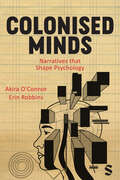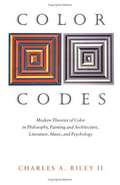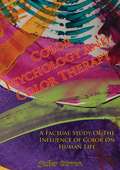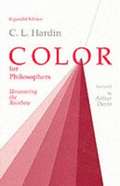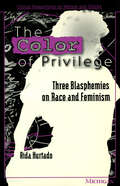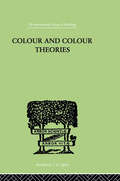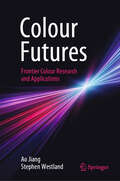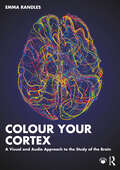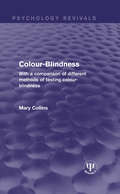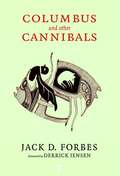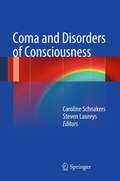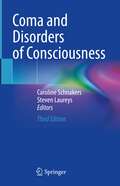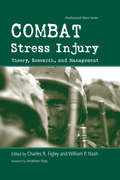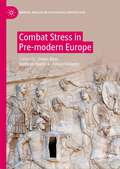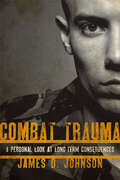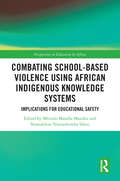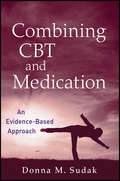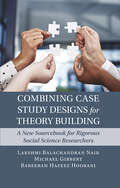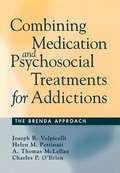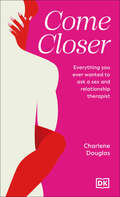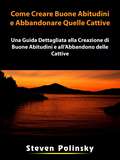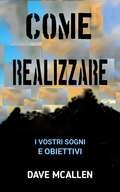- Table View
- List View
Colonised Minds: Narratives that Shape Psychology
by Akira O′Connor Erin RobbinsPsychology, as it is taught in the Global North, strives to be an objective science beyond reproach – but what happens when we examine the discipline critically, through an anti-colonial lens? This text pulls back the curtain on the existing canon to reveal the historical power structures that shaped the discipline, and examines the extent to which psychology today continues to uphold oppression. Colonised Minds situates current teaching and research of major topics in the field of psychology within the context of colonialism to better understand how some ideas were allowed to flourish while others were suppressed, censored, or left behind. This book will also direct you to critical, antiracist, and feminist approaches for the field and the modern university more generally – looking to voices and perspectives that have been marginalised for ways to rethink the way we see, and teach, psychology. Akira O’Connor is a Senior Lecturer in Psychology and the Institutional Race Equality Charter Chair at the University of St Andrews. Erin Robbins is a Lecturer in Psychology and the Director of Equality, Diversity, and Inclusion for the School of Psychology and Neuroscience at the University of St Andrews.
Colonised Minds: Narratives that Shape Psychology
by Akira O′Connor Erin RobbinsPsychology, as it is taught in the Global North, strives to be an objective science beyond reproach – but what happens when we examine the discipline critically, through an anti-colonial lens? This text pulls back the curtain on the existing canon to reveal the historical power structures that shaped the discipline, and examines the extent to which psychology today continues to uphold oppression. Colonised Minds situates current teaching and research of major topics in the field of psychology within the context of colonialism to better understand how some ideas were allowed to flourish while others were suppressed, censored, or left behind. This book will also direct you to critical, antiracist, and feminist approaches for the field and the modern university more generally – looking to voices and perspectives that have been marginalised for ways to rethink the way we see, and teach, psychology. Akira O’Connor is a Senior Lecturer in Psychology and the Institutional Race Equality Charter Chair at the University of St Andrews. Erin Robbins is a Lecturer in Psychology and the Director of Equality, Diversity, and Inclusion for the School of Psychology and Neuroscience at the University of St Andrews.
Color Codes: Modern Theories of Color in Philosophy, Painting and Architecture, Literature, Music and Psychology
by Charles A. Riley IIScholarly Essays on the symbolic use of color in the arts and literature.
Color Psychology And Color Therapy; A Factual Study Of The Influence of Color On Human Life: A Factual Study Of The Influence Of Color On Human Life
by Faber BirrenA detailed study of the various sources and biological and emotional uses of color in all phases of human existence by a leading researcher in the field.
Color of Privilege: Three Blasphemies on Race and Feminism (Critical Perspectives On Women And Gender)
by Aida HurtadoThis groundbreaking and important book explores how women of different ethnic/racial groups conceive of feminism. Aída Hurtado advances the theory of relational privilege to explain those differing conceptions. Previous theories about feminism have predominantly emphasized the lives and experiences of middle-class white women. Aída Hurtado argues that the different responses to feminism by women of color are not so much the result of personality or cultural differences between white women and women of color, but of their differing relationship to white men. For Hurtado, subordination and privilege must be conceived as relational in nature, and gender subordination and political solidarity must be examined in the framework of culture and socioeconomic context. Hurtado's analysis of gender oppression is written from an interdisciplinary, multicultural standpoint and is enriched by selections from poems by Sandra Cisneros, Gloria Anzaldúa, Lorna Dee Cervantes, and Elba Sanchez, and from plays by El Teatro Campesino, the United Farm Workers theater group. A final chapter proposes that progressive scholarship, and especially feminist scholarship, must have at its core a reflexive theory of gender oppression that allows writers to simultaneously document oppression while taking into account the writer's own privilege, to analyze the observed as well as the observer. Aída Hurtado is Associate Professor of Psychology, University of California, Santa Cruz.
Colour And Colour Theories (International Library Of Psychology)
by Christine Ladd-FranklinThis is Volume VIII of twenty-one in a collection on Cognitive Psychology. Originally published in 1929, the topic of this book, then, is the Ladd-Franklin theory of colour. Dr. Ladd-Franklin has been the first (and is still too nearly the only) physiologist to consider colour always in the light of the development of the colour-sense. This aspect of the subject is frequently reproduced in the present volume.
Colour Futures: Frontier Colour Research and Applications (Vision, Illusion and Perception #5)
by Stephen Westland Ao JiangThis book delves into the nuanced interplay of colour in human perception and its applications across diverse fields, highlighting the transformative impact on art, design, digital media, and technology. The book introduces an innovative approach by integrating scientific research with practical applications, making it a pivotal resource for designers, psychologists, and technologists. Its scope ranges from foundational aspects of colour vision to futuristic applications in virtual reality and artificial intelligence, offering fresh insights and forecasting emerging trends. This comprehensive exploration is essential for anyone interested in the strategic use of colour to enhance user experience and cultural expressions.
Colour Your Cortex: A Visual and Audio Approach to the Study of the Brain
by Emma RandlesBring your learning to life through the mindful art of colouring. Offering an alternative style of learning, this insightful book combines easy-to-follow explanations of brain anatomy and functions with detailed, labelled diagrams to colour in. While colouring, you can sit back, relax, and listen to the accompanying online audio podcast, which clearly explains each topic. The unique interactive book covers a comprehensive list of brain anatomy, including how our brains grow, brain cells and how they communicate, important functions of the brain, brain disorders and reactions, and how our brains are protected. Using a conversational tone throughout, each chapter engages the reader with succinct descriptions of each topic, allowing them to easily digest and process the information, as they colour in the accompanying diagram. The book then concludes with a chapter on mindfulness and what benefits it can have for your brain and learning.Designed to simplify complex concepts into bite-sized, understandable chunks, this is the ideal resource for psychology, neuroscience, nursing, and medical students who prefer visual and audible methods of learning. This book is also for anyone interested in understanding more about brain anatomy and functions, but with a little fun, creativity, and relaxation along the way.
Colour-Blindness: With a Comparison of Different Methods of Testing Colour-Blindness (Psychology Revivals)
by Mary CollinsOriginally published in 1925, this book embodies the results of research on red-green colour-blind subjects, supplemented by brief accounts of blue-yellow, total, and acquired colour-blindness to complete the description of the different forms of the defect. After a historical survey of previous work by such men as Dalton, Helmholtz, Rayleigh, Edridge-Green and others, the author deals with the most important theories of colour-blindness, and with a description of the tests and a discussion of their results.
Colours and Colour Vision
by Daniel KernellColours are increasingly important in our daily life but how did colour vision evolve? How have colours been made, used and talked about in different cultures and tasks? How do various species of animals see colours? Which physical stimuli allow us to see colours and by which physiological mechanisms are they perceived? How and why do people differ in their colour perceptions? In answering these questions and others, this book offers an unusually broad account of the complex phenomenon of colour and colour vision. The book's broad and accessible approach gives it wide appeal and it will serve as a useful coursebook for upper-level undergraduate students studying psychology, particularly cognitive neuroscience and visual perception courses, as well as for students studying colour vision as part of biology, medicine, art and architecture courses.
Columbus and Other Cannibals: The Wetiko Disease of Exploitation, Imperialism, and Terrorism (revised edition)
by Jack D. ForbesIn this revised edition of his 1978 classic, Forbes (Native American studies emeritus, U. of California Davis) continues to examine the history of contact between European whites and indigenous peoples, a history riddled with fear, hatred and genocide. Groundbreaking when it was first published, and still compelling reading, this account has inspired some the most influential activists in America for decades. Forbes presents a radical critique of modern civilization, from its central problems of identity to questions about the genesis of the universe and the creation of love, consumption and the cannibal psychosis, the spread of greed as a disease, the structure of materialism, the process of becoming a predator and the process of corruption, fascination with evil, the destruction of Native authentic cultures, the loss of freedom, the perpetuation of aggressive violence, the healing concept that the universe is our holy book, and what Jesus will do when He comes back. Annotation ©2009 Book News, Inc. , Portland, OR (booknews. com)
Coma and Disorders of Consciousness
by Caroline Schnakers Steven LaureysIn spite of medical advances and the increasing number of severely brain-injured patients, the assessment and treatment of patients recovering from coma remain challenging. For over 10 years now, the Coma Science Group has been working on the scientific exploration of disorders of consciousness, with both scientific and clinical research agendas. This book is the result of all this work. The aim is to offer both clinicians and researchers an opportunity to acquire expertise in a field which is constantly developing. Besides diagnostic, prognostic and ethical issues, this book includes well-established findings on assessment techniques (i.e., behavioral scales, electrophysiological explorations and structural/functional neuroimaging) and treatment procedures, but also techniques under development (i.e., the use of classifiers, brain-computer interfaces, transcranial magnetic stimulation or deep brain stimulation) which will stimulate ideas for future research. The Coma Science Group presents here a comprehensive book for readers, regardless of whether they are already familiar with the difficult but exciting field of disorders of consciousness.
Coma and Disorders of Consciousness
by Caroline Schnakers Steven LaureysComa and Disorders of Consciousness, 3e is a fully revised new edition offering a comprehensive review of the field for clinicians and researchers in the field of disorders of consciousness.Caring for patients with disorders of consciousness (DOC) such as unresponsive wakefulness syndrome (vegetative state) or minimally conscious state and related conditions such as locked-in syndrome currently represent a financial, medical and ethical conundrum. Although severe brain injuries represent a fraction of the population with brain injury, their cost is enormous (around $4 billion in direct medical costs per year), mostly due to the long-term care they need. The impressive number of studies performed on disorders of consciousness in the last decade has allowed refining diagnosis criteria, acquiring a better understanding of prognosis, and developing new tools to care and treat this challenging population. In this context, recently published milestone papers have provided new guidelines to clinicians for managing patients with DOC. This should lead to a shift in mentality and in the way we care for these patients. This book brings together researchers and clinicians to write about recent and future changes that will altogether improve the outcome of patients with DOC.
Combat Stress Injury: Theory, Research, and Management (Psychosocial Stress Series)
by William P. Nash Charles R. FigleyCombat Stress Injury represents a definitive collection of the most current theory, research, and practice in the area of combat and operational stress management, edited by two experts in the field. In this book, Charles Figley and Bill Nash have assembled a wide-ranging group of authors (military / nonmilitary, American / international, combat veterans / trainers, and as diverse as psychiatrists / psychologists / social workers / nurses / clergy / physiologists / military scientists). The chapters in this volume collectively demonstrate that combat stress can effectively be managed through prevention and training prior to combat, stress reduction methods during operations, and desensitization programs immediately following combat exposure.
Combat Stress in Pre-modern Europe (Mental Health in Historical Perspective)
by Jason Crowley Kathryn Hurlock Owen ReesThis book examines the lasting impact of war on individuals and their communities in pre-modern Europe. Research on combat stress in the modern era regularly draws upon the past for inspiration and validation, but to date no single volume has effectively scrutinised the universal nature of combat stress and its associated modern diagnoses. Highlighting the methodological obstacles of using modern medical and psychological models to understand pre-modern experiences, this book challenges existing studies and presents innovative new directions for future research. With cutting-edge contributions from experts in history, classics and medical humanities, the collection has a broad chronological focus, covering periods from Archaic Greece (c. sixth and early fifth century BCE) to the British Civil Wars (seventeenth century CE). Topics range from the methodological, such as the dangers of retrospective diagnosis and the applicability of Moral Injury to the past, to the conventionally historical, examining how combat stress and post-traumatic stress disorder may or may not have manifested in different time periods. With chapters focusing on combatants, women, children and the collective trauma of their communities, this collection will be of great interest to those researching the history of mental health in the pre-modern period.
Combat Trauma: A Personal Look at Long-Term Consequences
by James D Johnson&“In this incredibly courageous expose,&” Vietnam veterans discuss the long-lasting effects of PTSD and their strategies for coping (Publishers Weekly). Though much has been written about the short-term experience of combat trauma, very few resources discuss how that trauma continues to impact individuals into later life. In this volume, retired Army Chaplain James D. Johnson relates how fifteen Vietnam veterans have been affected by the terror they experienced four decades ago, and how it continues to affect them today. With candor and vivid detail, they reveal how their combat trauma symptoms still infect their thoughts, feelings, and behaviors on a daily basis. Their stories offer valuable insight for today&’s soldiers returning from battle, as well as for their loved ones. The experiences shared here can help them address and cope with the ongoing challenges of PTSD. Those who still carry these wounds will find that they are not alone, and that there are ways of dealing with the horror, no matter how long ago it took place.
Combating School-Based Violence Using African Indigenous Knowledge Systems: Implications for Educational Safety (Perspectives on Education in Africa)
by Mfundo Mandla Masuku and Nomakhosi Nomathemba SibisiUsing African epistemologies to understand contributing social and cultural factors around African school violence, this book investigates various kinds of school-based violence suffered by learners and teachers in order to further research into the impact of educational interventions on crime prevention in African schools.Investigating various kinds of school violence including gender-based violence and gang violence, the book uses African Indigenous Knowledge Systems and the philosophy of Ubuntu for example to tackle important concerns surrounding school violence, social cohesion, community engagement and role of education in fostering sustainable communities. Chapters demonstrate a qualitative research approach that encompasses empirical and conceptual studies to provide an in-depth exploration of violence in educational settings; the book draws on human experiences and emotions, as well as teachers’, learners’, communities’ and other relevant stakeholders’ perceptions of school violence.This highly interdisciplinary volume will be of immense value to scholars, researchers and postgraduate students in the fields of sociology of education, philosophy of education and educational psychology. Curriculum developers involved with module design may also find the volume of use.
Combining CBT and Medication
by Donna M. SudakCombining medication and cognitive behavioral therapy (CBT) can be challenging but can also enhance patient care. This book reviews the existing literature about the neurobiological and clinical basis in combining CBT and medication for non-psychiatrist mental health clinicians. Filled with case studies drawn from the author's extensive clinical and teaching experience, this book breaks new ground in bringing together the most current, proven protocols for using drugs and CBT to improve client care. Practitioners will find in this volume the tools to make informed recommendations to patients.
Combining Case Study Designs for Theory Building: A New Sourcebook for Rigorous Social Science Researchers
by Michael Gibbert Lakshmi Balachandran Nair Bareerah Hafeez HooraniCase study research is a versatile approach that allows for different data sources to be combined, with its main purpose being theory development. This book goes a step further by combining different case study research designs, informed by the authors' extensive teaching and research experience. It provides an accessible introduction to case study research, familiarizes readers with different archetypical and sequenced designs, and describes these designs and their components using both real and fictional examples. It provides thought-provoking exercises, and in doing so, prepares the reader to design their own case study in a way that suits the research objective. Written for an academic audience, this book is useful for students, their supervisors and professors, and ultimately any researcher who intends to use, or is already using, the case study approach.
Combining Medication and Psychosocial Treatments for Addictions: The BRENDA Approach
by Charles O'Brien Joseph Volpicelli Helen Pettinati A. McLellanRecent studies have shown combined addiction treatments to be more effective than either medication or talk therapy alone. This practical manual presents an empirically supported 6-stage framework for managing biopsychosocial treatment of alcohol and drug dependence. The BRENDA approach helps practitioners integrate emerging and established psychosocial and medical intervention approaches into a comprehensive treatment program that is tailored to the needs of the individual patient. Fully compatible with cognitive-behavioral and 12-step treatment models, BRENDA incorporates the use of newly developed medications, such as naltrexone, that target the biological underpinnings of addiction. The approach has been demonstrated effective in more than 80% of alcohol dependent referrals to the authors' treatment program. Illustrated with extended case examples, the manual describes how to conduct a thorough evaluation and assessment, select appropriate interventions, enhance the patient's motivation to change, coordinate service delivery with other providers as needed, and maximize treatment compliance. Appendices include samples of substance abuse screening instruments and information about naltrexone pharmacotherapy.
Come Closer: Everything You Ever Wanted to Ask a Sex and Relationship Therapist
by Charlene DouglasFeeling a disconnect in your sex life?Sex and relationship therapist Charlene Douglas invites you to connect more, communicate better, and love more deeply.Perhaps you’ve considered seeing a therapist before but you worry it might be awkward or it’s too expensive... Come Closer provides the safe space you need to reflect on the past experiences that may have shaped your sexual world, explore what turns you on and what turns you off, and open up to issues in communication and sexual health.Charlene draws on real-life case studies from her experience helping individuals and couples to navigate different relationship problems and combines this with interactive intimacy tasks at the end of each chapter to give you something practical to work on.So whether you’re hoping to reignite an old spark or build a new sense of confidence in the bedroom, take the first step towards a happy and healthy sex life with Come Closer.
Come Creare Buone Abitudini e Abbandonare Quelle Cattive: Una Guida Dettagliata alla Creazione di Buone Abitudini e all’Abbandono delle Cattive
by Hiddenstuff EntertainmentTi trovi spesso a svolgere attività che sai essere malsane per te? Ti trovi spesso a sprecare il tuo tempo su cose di scarsa importanza? Sai benissimo cosa dovresti fare ma per qualche ragione non ne sei in grado? Hai problemi a concentrarti? Se hai risposto sì ad almeno una di queste domande, allora questa guida potrà aiutarti a cambiare la tua vita. Vorresti divenire in grado di creare abitudini positive, abbandonare quelle negative, migliorare la salute, sentirti più felice e completare qualsiasi attività a mente perfettamente lucida? Le tecniche per la dissipazione delle cattive abitudini vengono usate da tempi immemori per aiutare le persone a prendere decisioni migliori in ogni ambito della loro vita. Usare queste tecniche aiuta anche a migliorare la salute, aumentare i risparmi, guadagnare denaro, vivere meglio, mangiare meglio, prendere decisioni migliori, incrementare i livelli di energia e di concentrazione, rendere più felici e molto altro ancora! Che aspetti? Inizia a vivere emozioni più positive e una vita di qualità più elevata grazie a questa skill essenziale! Scoprirai i segreti usati da professionisti e professioniste per massimizzare l’efficacia in ogni ambito. Concentrati solo su ciò che conta e ottimizza la tua produttività. Con alle spalle decenni di strategie testate, questo E-book ti mostrerà il modo più rapido ed efficace per abbandonare le abitudini negative e costruirne di positive, contribuendo immensamente al tuo benessere. Questa guida insegna tecniche comprovate che non necessitano l’uso di supplementi, prescrizioni o corsi costosi. Leggendo la guida scoprirai come: - Creare Buone Abitudini. - Abbandonare le Abitudini Cattive. - Essere più Sano/a e Felici. - Prendere Decisioni Migliori. - Guadagnare Più Denaro. - Avere Più Energia. - Ridurre ed Eliminare l’Ansia. - Aumentare la Produttività. - Superare Facilmente Indisposizioni, Ostacoli e
Come Porre Fine ad un Disturbo da Alimentazione Incontrollata: un manuale di trattamenti per l'ansia, guarire, & dimagrire senza farmaci
by Hiddenstuff EntertainmentUn manuale dettagliato sulla salute per comprendere ed eliminare naturalmente il grasso corporeo curando il disturbo da alimentazione incontrollata. Ti senti bloccato e non in grado di porre fine al mangiare troppo? Non sei in grado di perdere perso o di mantenerlo quando sei a dieta? Questo manuale ti aiuterà a capire come sfruttare le naturali capacità del corpo nel bruciare i grassi e stare in forma e porre fine all'alimentazione incontrollata. Basato su tecniche scientifiche provate, questo libro ti insegnerà a: - Sopprimere l'appetito - Porre fine e frenare le voglie - Porre fine al mangiare troppo - Avere migliori abitudini per perdere peso - Aumentare le tue energie ed il tuo metabolismo Se vuoi porre fine all'alimentazione incontrollata, avere più energie, e perdere peso, allora questo libro fa per te --> Vai in cima alla pagina e clicca su aggiungi al carrello per acquistarlo immediatamente Disclaimer: Questo autore e / o i detentori dei diritti non fanno alcuna rivendicazione, promessa o garanzia circa l'accuratezza, la completezza o l'adeguatezza dei contenuti di questo libro e declina espressamente la responsabilità per errori e omissioni nei contenuti all'interno. Questo prodotto è solo per riferimento.
Come Realizzare i Vostri Sogni e Obiettivi
by Dave McAllenIn questo consiglio-ossessione che definisce la generazione, un autore importante passa attraverso tutte le schifezze per mostrarci come smettere di cercare di essere costantemente "perfetti", in modo che possiamo raggiungere il nostro pieno potenziale ed essere persone più felici. La storia è piena di consigli su come agire, comportarsi e fare tutto alla perfezione, raggiunti attraverso l'imitazione di un mentore. Così, ci sono giudici e veggenti che stabiliscono se si farà fortuna nella vita, se si eccellerà in una carriera e quant'altro. Ma Dave vi presenta la cruda realtà e la confortante verità: “Rule your destiny yourself”. “Come realizzare i vostri sogni e obiettivi” è il suo antidoto alla mentalità viziata e priva di sentimenti che ha infettato il mondo e riconfigurato una generazione, avvantaggiandoli con ogni dritta di grande pregio. Dave non è d'accordo sul fatto che, corroborato sia da ricerche storiche che da esempi accurati, le persone di successo diventino quello che sono oggi dipenda, non dalla capacità dei padrini e degli esperti di prevedere con precisione il nostro destino, ma dall'imparare a conoscere sé stessi e rimanere concentrati sui propri sogni. Tutti gli esseri umani hanno debolezze e mancanze con perdenti e vincitori, alti e bassi, grandi e piccole - non tutti noi possiamo diventare eccezionali e bravissimi. Ma se la direzione naturale della nostra vita viene cambiata, diventa un disastro ancora più grande. Dave ci consiglia di fare uno studio approfondito su noi stessi in modo da poter essere fedeli verso ciò che siamo stati destinati a diventare. Una volta fatto questo, abbracciate la vostra personalità di fondo e smettete di mettere il vostro destino nelle mani di altre persone - siano essi vostri coetanei, genitori, insegnanti, ecc. fatevi coraggio, evitate i sentimenti, rimanete concentrati, siate agguerriti e non vi rammaricate mai.
